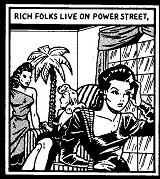Stephen Biko has been on my mind lately, mostly because Peter Gabriel's song Biko keeps popping up on iTunes.
Hearing it reminds me of several things all at once. Gabriel's song appeared on his third album, one in which he matched innovative music with political material, in songs such as Games Without Frontiers. But it was Biko that blew the lid off what for many people in the West was a hidden system: apartheid.
Many recording artists have made themselves known by a certain style of music and then produced a song that was totally outside their previous catalog yet loaded with truth, heart-felt emotion, and often, anger.
The Cranberries were known for beautiful songs such as Dreams before uncorking Zombie, a protest song about the Troubles, a song full of emotion, pain, drums, and great guitar hooks. In the same way, Bruce Cockburn wrote some very fine folk songs that got a lot of radio play, but his music became more progressive and politically-oriented over time. Then came If I Had A Rocket Launcher, perhaps his best, most honest song. It spoke of the despair and frustration he felt when he visited a Guatemalan refugee camp in Mexico in the early 1980s.
Even Norman Greenbaum, an observant Jew, came up with something totally different from his usual work. The song Spirit in the Sky, he said, was inspired by Westerns he had watched on television when he was a kid. In a Wikipedia article, he said, "The song itself was simple, when you're writing a song you keep it simple of course. It wasn't like a Christian song of praise it was just a simple song. I had to use Christianity because I had to use something. But more important it wasn't the Jesus part, it was the spirit in the sky. Funny enough ... I wanted to die with my boots on." In 2011, he said, "It sounds as fresh today as when it was recorded. I've gotten letters from funeral directors telling me that it's their second-most-requested song to play at memorial services, next to 'Danny Boy'."
Billy Holiday was famous for her haunting rendition of Strange Fruit, which was written and composed by Abel Meeropol (under his pseudonym Lewis Allan). Nina Simone built a career out of singing unpopular yet incredibly honest and singable songs such as Mississippi Goddam, her first protest song.
These are all powerful and sometimes, out-of-character, songs.
And then there's Biko.
In this song, Peter Gabriel condemned the apartheid system in South Africa. He condemned the killing of an innocent man. And he issued a warning to all who heard this eulogy of a song.
September '77
Port Elizabeth weather fine
It was business as usual
In police room 619
Oh Biko, Biko, because Biko
Oh Biko, Biko, because Biko
Yihla Moja, Yihla Moja
- The man is dead
From Wikipedia: Stephen Biko was an anti-apartheid activist who was arrested because he would not keep quiet about the injustice of apartheid. In August 1977, Biko was arrested for continuing to speak out, breaking his banning order.
After his arrest Biko was held in custody in Port Elizabeth, Eastern Cape for several days, during which he was interrogated. During his interrogation he was beaten by some of the policemen questioning him. He suffered severe injuries, including to his brain, and he died soon after on September 12.
When I try to sleep at night
I can only dream in red
The outside world is black and white
With only one color dead
Oh Biko, Biko, because Biko
Oh Biko, Biko, because Biko
Yihla Moja, Yihla Moja
- The man is dead
Only one color dead. Biko's goal was to overturn an unjust system which, if successful, would also overturn the government. This made him a threat to the established order. In the U.S. in recent years, we have seen other innocent men die - killed - simply because they were black and in the wrong place at the wrong time; all they wanted to do was get through the day.
You can blow out a candle
But you can't blow out a fire
Once the flames begin to catch
The wind will blow it higher
Oh Biko, Biko, because Biko
Yihla Moja, Yihla Moja
- The man is dead
And the eyes of the world are
Watching now
Watching now
All of the songs listed here point a finger at those who look the other way. As Jesus once said to a lawyer, of all people, what do you read there? (Luke 10:26)
* * *
Steven Biko image on a Heerlen church stained glass window. Artist: Daan Wildschut; photographer: Sergé Technau - Wikimedia Commons, CC BY-SA 4.0, https://commons.wikimedia.org/w/index.php?curid=61673677













